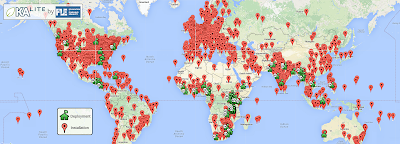 |
| Locations of deploying organizations and installations of the offline Khan Academy. |
The Khan Academy is arguably the most important source of online learning on the Internet. Over 39 million teachers and learners have used their collection of 57 innovative, highly modular courses for students from grade school to university.
The Open Courseware site of the prestigious Massachusetts Institute of Technology (MIT) hosts teaching material that has been used in over 2,300 classes during the last 15 years. The material has been provided by professors in 31 departments (not all technical) and is viewed by over 1.5 million unique visitors per month.
Online access to these sites is impossible for the vast majority of Cubans, but there are offline versions of both.
These could be used by individuals for self-study or installed on local area networks in schools, universities, Youth Computer Clubs, etc. and accessed offline. The site software and teaching content could be distributed on portable drives. An Internet connection would be needed for periodic updates -- MIT recommends a connection speed of at least 1 Mbit/second. Updates could be distributed on portable drives to users without connectivity.
I've summarized this proposal in a few sentences, but regular, nationwide distribution would require organization and support. Could a Cuban University, the Youth Clubs or the Ministry of Education create El Paquete Educativo?
Cuba could become more than a consumer of educational material. For a start, El Paquete Educativo could be distributed to Spanish-speaking people in other nations. More important, Cuba could be a source of Spanish-language educational content. This is a time of global innovation in online education and the institutions surrounding it. Exposure to software like MIT's Open Courseware or the Khan Academy would inspire Cuban developers and educators.
I have posted short descriptions of the Khan Academy and MIT's Open Courseware Project online. If you have good Internet connectivity, you can also visit their sites -- MIT Open Courseware, the Khan Academy in Englsih and the Khan Academy in Spanish.
-----
Update 3/29/2016
You can see a Spanish translation of this post at:
http://huxley.cubava.cu/2016/03/18/material-de-ensenanza-para-cuba-el-paquete-educativo/
-----
Update 5/3/2018
Teaching material or other content can also be bundled with low-cost server hardware. In this example, a handheld $30 server creates a WiFi LAN and serves medical information in South Asia. The same hardware could be used to deliver other content, like Wikipedia in Spanish.





